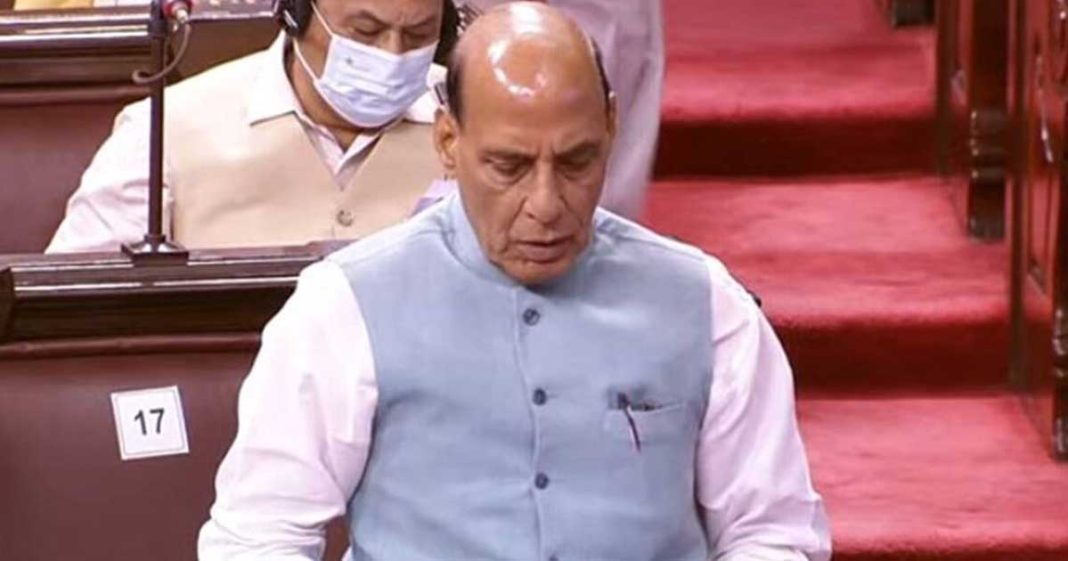The Indian Defence Minister, Rajnath Singh, on Tuesday 15th March, addressing the session in the upper house of parliament, said that the accidental firing of missile into Pakistani territory was “regrettable.” He also expressed his relief that the incident exacted “no loss of life.” Talking about the incident, he added that it took place during a “routine maintenance” when one missile was released unintentionally. However, in a surprise revelation, he said that the Indian missile system was “safe, secure and reliable.”
To clarify, on March 9, the PAF Air Defence Operation System detected a high-speed flying object inside the Indian territory. The object was picked up at 18:43 hours which, after remaining airborne, suddenly maneuvered from its initial course and intruded into Pakistani territory. DG ISPR revealed a statement and described it as “a supersonic flying object.”
While there was no loss of life, the object did cause damage to civilian property. Furthermore, Pakistan summoned India’s Charge d’Affaires (Cd’A) to convey Pakistan’s strong protest over the unprovoked violation of its airspace. Pakistan also warned the Indian government of the unpleasant consequences of such negligence. Soon after, India released its own statement in which the nuclear state pinned the blame on a “technical malfunction” during routine maintenance.
Read More: Two Indians arrested in alleged uranium smuggling
“On 9 March 2022, in the course of routine maintenance, a technical malfunction led to the accidental firing of a missile,” the statement said. The government of India initiated an investigation into the matter, but Pakistan asserts that a “joint probe” should be conducted.
Islamabad has also listed a series of questions regarding security protocols and technical safeguards against the accidental or unauthorized launch of missiles. Furthermore, China has also urged the two countries to launch a thorough investigation into the matter. Chinese Foreign Ministry Spokesperson Zhao Lijian, in a regular press briefing, said, “We call on relevant countries to have dialogue and communication as soon as possible and launch a thorough investigation into this incident, strengthen information sharing and establish a notification mechanism in time to prevent the recurrence of such incidents and miscalculations,”
In a nuclear environment, such callousness & ineptitude raises questions about the safety & security of Indian weapon systems. Already, there have been multiple incidents of uranium theft in India and its citizens have even been arrested while smuggling uranium in the recent past
— Moeed W. Yusuf (@YusufMoeed) March 11, 2022
Pakistan’s National Security Advisor (NSA), Moeed Yusuf, slammed India on Twitter. In a Twitter thread raised a series of questions regarding India’s ability to handle “sensitive technology.”
He added that “It is also highly irresponsible of Indian authorities not to have informed Pakistan immediately that an inadvertent launch of a cruise missile had taken place”. The NSA further noted that such callousness and ineptitude raises questions about the safety and security of Indian weapons systems. Especially in a nuclear environment where a minor strategic miscalculation can have severe repercussions.
Read More: India investigating missile accidentally fired into Pakistan
NSA Moeed Yusuf also called for an investigation into the “real circumstances surrounding” the March 9 incident “to ascertain if this was an inadvertent launch or something more intentional” as “it is hard to believe anything this Indian government says.”
The National Security Advisor also recalled India’s lack safe and secure structure around its fissile materials. According to a research paper issued by a Pakistani think tank, SASSI, 18 cases of nuclear theft from India have been reported from 1994 to 2021. Moreover, a significant uptick of such incidents was reported in recent years, especially in 2021, which recorded multiple cases of nuclear material theft from India.
Such incidents point to lax control, poor regulation, and incompetence on part of the regulatory and the enforcement authority. Pakistan has repeatedly called for the international community to ensure nuclear safety and security standards in its neighboring country, which has emerged as a hotspot for such activities in recent years.
Read More: 6 kg illegal uranium caught once more in India













